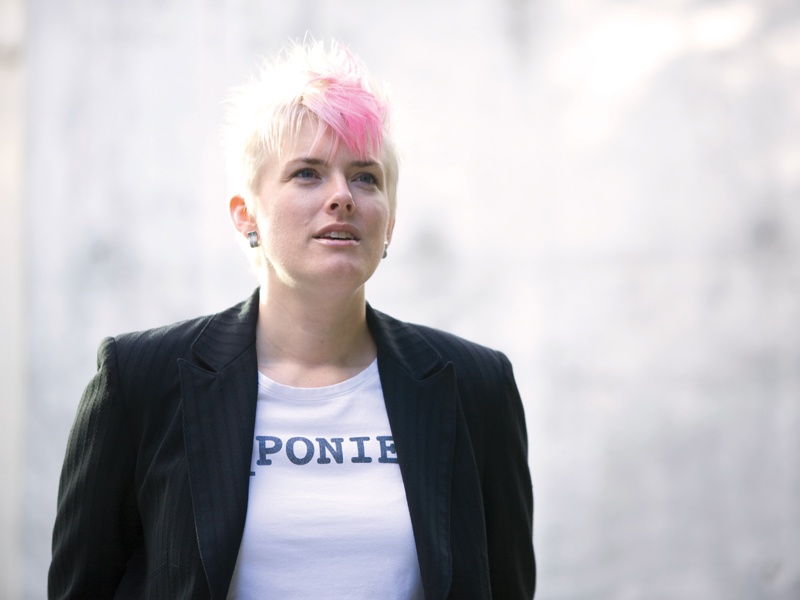Why is open source dominated by men?
Less than 3% of open source producers are women

Anyone can participate in FLOSS - it's an open meritocracy - and yet less than 3% of producers are women. If nearly a third of proprietary software producers are female, what is it about FLOSS production that puts so many women off?
A 2006 FLOSSPOLS study found it could be the highly social nature of FLOSS which leads to the under-representation. Cultural biases, stereotyping and a degree of insularity may not only put off potential female contributors, but also inhibit efforts to diversify the culture and communicate FLOSS agendas.
FLOSS has a markedly individualistic culture so, if there are few females involved, men tend to assume that women have chosen not to get involved.
The culture also tends to value coding rather than the many specialisms which go into the production of software. Women often work on user interfaces or documentation - less visible jobs with a lower status. There are plenty of female coders, but they tend to be even less visible and their work is often assumed to be that of a man.
Kernel hacker Valerie Aurora even published a spoof 'admitting' to having been a man all along and complaining about how difficult it had been to keep up the pretence!
There are also practical issues. Men usually have more free time outside of work while women, statistically speaking, shoulder the lion's share of domestic responsibilities. Women also tend to enter computing later in life and, in a traditionally self-taught culture, this steepens the learning curve significantly.
Flaming is also disproportionately off-putting to women and likely to deter them from participating in support communities. These findings were not news to the women already participating but they did validate their concerns. It also confirmed that more women really did want to participate and that 66% of men also thought FLOSS would benefit from more female participation.
Sign up for breaking news, reviews, opinion, top tech deals, and more.
Taking action
In the wake of FLOSSPOLS, Melissa Draper wrote an open letter to the community calling for more care to be taken to avoid gender stereotyping, and women involved in various FLOSS projects started to gather their own statistics.
In 2008, the GeekFeminism blog began recording incidents of sexist stereotyping at public events. The discussion on women and FLOSS culture had broken the surface. The following year, a number of women were invited to give keynotes at prestigious FLOSS conferences.
In her 2009 OSCON keynote, Standing Out in the Crowd, Alex Bayley ('Skud') estimated that 5% of Perl developers and 10% of Drupal developers were women. She talked about how alienating it can feel to be "the only one" at FLOSS events and quoted Jono Bacon's quip about how a man would feel about being the only guy in a nail salon.
This year, Wikipedia's Editor Survey threw up some equally stark statistics: only 13% of editors are female and of those, 7% had experienced 'inappropriate' comments and 4% even reported having been 'stalked' online.
A blog by Wikipedia's executive director Sue Gardner garnered rather more candid comments, including complaints about widespread hostility and inappropriate behaviour. Harassment affects a very small proportion of women in FLOSS but, when it does happen, it can range from being extremely unpleasant to positively alarming. It can take the form of unwanted sexual attention and even go as far as online stalking or virulent trolling involving hostile, offensive language and outright bullying.
Its few but grim examples are more than enough to discourage many women if they don't feel they have the support of the wider community. Whilst most men are apologetic and want to help, they may not know how to deal with the situation and may also find it hard to believe in the first place.
Although Aurora points out that: "We're still having public arguments on Linux mailing lists about whether it's OK to grope a woman at a conference if she's flirting or wearing a short skirt or (heaven forbid) drinking the conference-provided free beer."
In most cases, however, stereotyping and inappropriate sexualisation are mild, casual and inadvertent - leading to horrified apologies from guys who were just engaging in a bit of bonhomie and had no idea that a bit of fun could have created an uncomfortable environment for women.
This became a particularly hot issue in 2009 when Matt Aimonetti used soft-porn images at the Ruby conference; his presentation was later removed from Slideshare and the chair apologised.
Stallman, who has frequently spoken out against sexism, still managed to make a gaffe about 'Emacs virgins' and even Shuttleworth, known for championing courteousness, was pulled up for commenting that Linux was "hard to explain to girls". In response, there was a flurry of articles in the technical press raising awareness of gender stereotyping and inappropriately sexualised language.
Making women welcome

EARLY GENIUS: Ada Lovelace - considered by some to be the world's first computer programmer
As Skud pointed out in her OSCON keynote, it feels uncomfortable to "be the only one". It's even worse to feel alone when dealing with harassment or the flaming which results from a competitive tendency to 'put down' less knowledgeable people.
But women are not the only sufferers. Taking a little trouble to introduce and orientate new people can transform everyone's experience positively. Both women and men are engaged in many projects to diversify and humanise FLOSS culture.
The first group of women coders, Systers, was founded by Anita Borg in 1987. Rosiex founded GeekGirls in 1993. Pioneering LinuxChix caused a stir when it was launched by Deb Richardson in 1998 - it grew to a substantial international organisation with chapters in many countries, and many of the most prominent women in FLOSS have been involved.
Initially, its logo was an overly sexualised woman with huge breasts and the word 'Linux' stretched across them. 'Chix' was also a problematic term and a campaign was launched by Aurora to change the logo - Robotux was the result.
The first LinuxChix and Women In Open Source miniconfs were held in 2007. In 2009 The Free Software Foundation (FSF) hosted a mini-summit out of which the FSF Women's Caucus was founded. 2009 also saw the first avowedly diverse FLOSS development project, when Denise Paolucci founded Dreamwidth, which forked from LiveJournal.
Dreamwidth achieved 75% female participation and inspired Python's Diversity List. More recently, Gina Trapani's ThinkUp has also attracted a substantial code contribution from women.
WoMoz was founded in 2009 to publicise and support other FLOSS women's projects but also to promote participation in Mozilla projects. It kicked off with a survey which showed that Mozilla is doing remarkably well, with 16.75% female participation - 13.24% of whom are developers.
Gnome Women launched an outreach programme in 2010 and the Gnome Foundation sponsors three internships for female college students from the southern hemisphere. The students receive a bursary to work on various Gnome projects and participate in the community.
PHP Women aims to bring together the scattered global community of PHP developers. DrupalChix estimates that women now make up 17% of Drupal developers, making it another of the more woman-friendly projects. Sue Gardiner at the Wikimedia Foundation is developing a campaign to make Wikipedia more friendly to female editors, with a discussion on developing a Women on Wikipedia Month.
By now, many of the most important FLOSS organisations have women's groups - including FSF, Debian, Ubuntu, Fedora, Gnome, KDE, Python, Mozilla, Drupal, PHP and Rails.